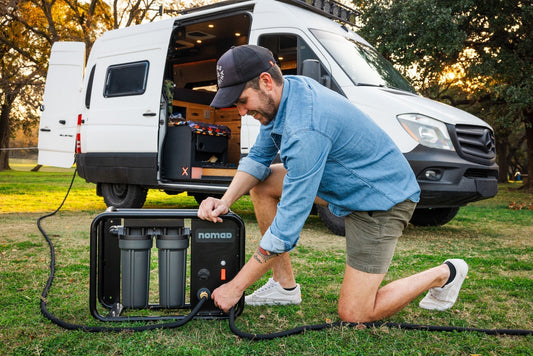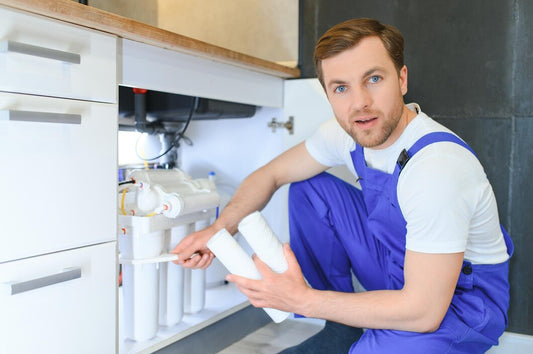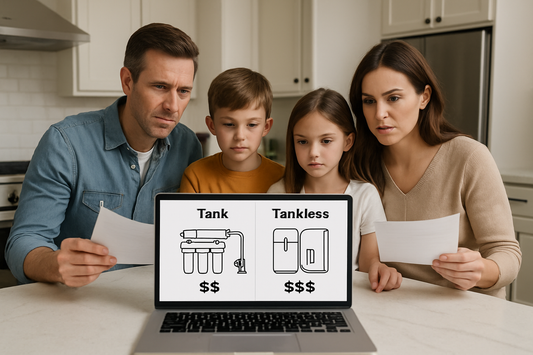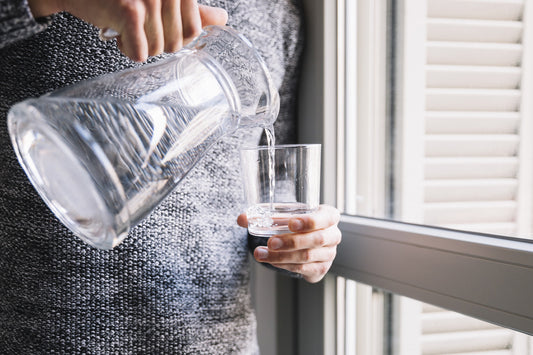Standing in your kitchen, watching white spots accumulate on your dishes despite multiple rinse cycles, you're probably wondering if it's time to tackle that water softener installation project you've been putting off. The good news? You have options. The question isn't whether you need a water softener—it's whether you should install it yourself or call in the professionals.
Why Your Home Needs a Water Softener
The Hidden Costs of Hard Water
Hard water isn't just about soap scum and mineral buildup. It's slowly destroying your appliances, increasing your energy bills, and making daily tasks unnecessarily difficult. That dishwasher you bought three years ago? Hard water could cut its lifespan in half. Your water heater is working overtime, burning through energy as mineral deposits create an insulating barrier that reduces efficiency by up to 25%.
Beyond the financial impact, hard water affects your daily comfort. Your skin feels dry after showers, your hair lacks shine, and your clothes come out of the wash feeling rough and looking dingy. These aren't just minor inconveniences—they're quality-of-life issues that affect your entire household.
The Immediate Benefits of Water Softening
Once you install a water softener, the transformation is remarkable. Appliances run more efficiently, extending their lifespan significantly. Your monthly detergent and soap usage drops by 50-75% because soft water creates better lather with less product. Most importantly, your family notices the difference immediately—softer skin, shinier hair, and cleaner dishes without those frustrating water spots.

Image by Mateus Andre
DIY Water Softener Installation: Is It Right for You?
When DIY Makes Sense
Installing a water softener yourself can save you $300-800 in labor costs, making it an attractive option for handy homeowners. You're a good candidate for DIY installation if you have basic plumbing experience, own standard tools, and feel comfortable working with water lines. The process typically takes 4-6 hours for someone with moderate DIY skills.
Most importantly, DIY installation works best in straightforward scenarios: standard plumbing configurations, accessible installation areas, and newer homes with copper or PVC pipes. If your home fits these criteria and you're comfortable with the time investment, DIY can be highly rewarding.
Essential Tools and Components
Your water softener installation toolkit should include pipe cutters, adjustable wrenches, Teflon tape, pipe fittings, and a drill with bits. The softener system itself comes with critical components: the bypass valve, drain hose, overflow assembly, and detailed instructions. Don't forget safety equipment—safety glasses and gloves are non-negotiable when working with plumbing.
Before starting, test your water hardness using the included test kit. This baseline measurement ensures you'll program your system correctly and verify successful installation later.
Step-by-Step DIY Installation Process
Preparation and Planning
Choose your installation location carefully. The area needs electrical access, proper drainage, and enough space for maintenance. Basements, utility rooms, and garages are popular choices. Ensure you can access your main water line easily—this is where you'll connect the softener.
Turn off your main water supply and drain the lines by running faucets throughout the house. This prevents water damage and makes the installation process cleaner and more manageable.
Connecting the System
Install the bypass valve first—this allows you to redirect water around the softener during installation and future maintenance. Cut into your main water line using pipe cutters, ensuring clean, straight cuts. Connect the inlet and outlet pipes to the softener, following the manufacturer's specific instructions for your model.
The drain connection is crucial for proper operation. Route the drain hose to a floor drain, utility sink, or sump pump, ensuring it's secured and won't move during the regeneration cycle.
Programming and Testing
Modern water softeners feature digital controls that require initial programming. Input your water hardness level, household size, and regeneration schedule. Run a manual regeneration cycle to ensure all connections are secure and the system operates correctly.
Test your water hardness again after the first regeneration cycle. If readings show successful softening, your DIY installation is complete. If not, double-check connections and programming settings.

Image by freepik
Professional Installation: When to Call the Experts
Complex Scenarios Requiring Professionals
Certain situations absolutely require professional installation. If your home has galvanized steel pipes, complex plumbing configurations, or limited access to main water lines, professionals have the expertise and tools to handle these challenges safely.
Water softener installation cost for professional service typically ranges from $500-1,200, depending on complexity and local labor rates. This includes the service call, installation, testing, and initial programming—essentially everything needed for a fully operational system.
Professional Installation Benefits
Licensed plumbers carry insurance, offer warranties on their work, and can handle unexpected complications without additional stress on you. They're also familiar with local building codes and permit requirements, ensuring your installation meets all regulatory standards.
Most importantly, professionals can identify and address potential issues before they become problems. They'll assess your specific plumbing configuration, recommend optimal placement, and ensure proper sizing for your household's needs.
Water Softener Installation Cost Breakdown
DIY Cost Analysis
DIY installation costs primarily involve the softener unit itself, typically ranging from $400-1,500 depending on capacity and features. Additional expenses include fittings, pipe, and tools you might not already own, adding $50-150 to your total investment.
The water softener installation price for DIY projects averages $450-1,650 total, representing significant savings compared to professional installation. However, factor in your time investment—most homeowners spend 6-8 hours on first-time installations.
Professional Service Pricing
Professional water softener installation cost ranges from $1,000-2,500 complete, including the unit and labor. This cost of water softener and installation varies based on system complexity, local labor rates, and any additional plumbing modifications required.
Many contractors offer package deals that include the softener, installation, and initial maintenance, providing better value than purchasing components separately.
Making the Right Choice for Your Home
Evaluating Your Situation
Consider your skill level honestly. If you've successfully completed plumbing projects before and feel confident working with water lines, DIY installation can be rewarding and cost-effective. However, if plumbing makes you nervous or your home has complex pipe configurations, professional installation provides peace of mind and guaranteed results.
Time is another crucial factor. DIY installation requires a full day commitment, while professionals typically complete installations in 2-3 hours. Consider whether you prefer spending your weekend on this project or having it handled quickly by experts.
Long-term Considerations
Professional installation often includes warranties and service agreements that provide ongoing support. DIY installation puts future maintenance and troubleshooting entirely on you. Consider your comfort level with long-term system maintenance when making your decision.
Maintenance and Troubleshooting
Regular Maintenance Schedule
Regardless of installation method, your water softener requires regular maintenance. Check salt levels monthly, clean the brine tank quarterly, and test water hardness every six months. These simple tasks ensure optimal performance and extend system life.
Common Issues and Solutions
Low water pressure often indicates clogged filters or improper bypass valve position. Salt bridges in the brine tank prevent proper regeneration—break them up with a long tool and ensure proper salt levels. If your softener stops working entirely, check electrical connections and programming settings before calling for service.

Frequently Asked Questions
How long does water softener installation take?
DIY installation typically takes 4-6 hours for experienced homeowners, while professional installation usually requires 2-3 hours depending on complexity.
What's the average water softener installation cost?
Professional installation ranges from $1,000-2,500 total, while DIY projects cost $450-1,650 including the unit and materials.
Can I install a water softener myself?
Yes, if you have basic plumbing skills and standard home configurations. Complex plumbing or older homes may require professional installation.
How often should I service my water softener?
Check salt levels monthly, clean the brine tank quarterly, and schedule professional maintenance annually for optimal performance.
What size water softener do I need?
Calculate based on your household size and water hardness level. Most families need systems ranging from 32,000-64,000 grain capacity.
Your Next Steps
Whether you choose DIY or professional installation, the important thing is taking action. Hard water problems only worsen over time, and the sooner you install a water softener, the sooner you'll start saving money and enjoying better water quality.
For homeowners ready to tackle DIY installation, whole house water filtration systems offer comprehensive solutions for various home sizes and configurations. If you're leaning toward professional installation, residential water treatment collections provide options that work with most local contractors.
Remember, the best water softener installation is the one that gets completed properly and starts solving your hard water problems immediately. Choose the path that fits your skills, schedule, and budget—your future self will thank you for taking action today.





